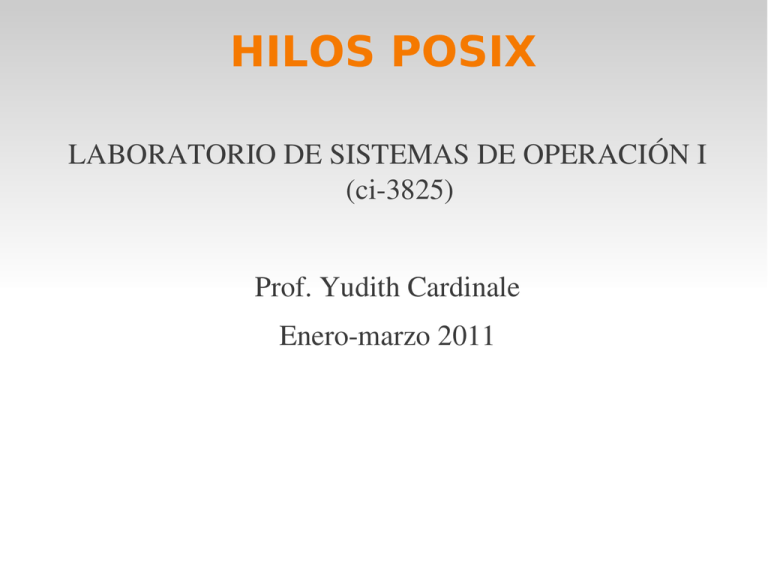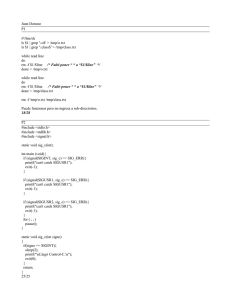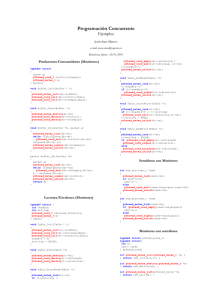hilos posix
Anuncio

HILOS POSIX
LABORATORIO DE SISTEMAS DE OPERACIÓN I (ci­3825)
Prof. Yudith Cardinale
Enero­marzo 2011
Librería
HILOS POSIX
●
#include <pthread.h>
Función que se comportará como hilo:
void * mihilo(void *arg) {
. . . //instrucciones
} ●
Algunos tipos y macros: pthread_t idh; //id del hilo
pthread_attr_t atrh; //atributos del hilo
PTHREAD_SCOPE_SYSTEM: hilo a nivel de kernel
PTHRAD_SCOPE_PROCESS: hilo a nivel de usuario
●
Inicializar y destruir atributos
pthread_attr_init(pthread_att_t *attr);
pthread_attr_destroy(pthread_att_t *attr);
●
Ejemplo:
HILOS POSIX
p_thread_attr_t misattr;
…
pthread_attr_init(&misattr);
pthread_attr_setscope(&misattr,PTHREAD_SCOPE_PROCESS);
…..
pthread_attr_destroy(&misattr);
Algunos atributos que pueden ser inicializados:
int pthread_attr_setdetachstate(pthread_attr_t *attr, int detachstate);
int pthread_attr_setguardsize(pthread_attr_t *attr, size_t guardsize);
int pthread_attr_setinheritsched(pthread_attr_t *attr, int inheritsched);
int pthread_attr_setschedparam(pthread_attr_t *attr, const struct sched_param *param);
int pthread_attr_setschedpolicy(pthread_attr_t *attr, int policy);
int pthread_attr_setscope(pthread_attr_t *attr, int contentionscope);
int pthread_attr_setstackaddr(pthread_attr_t *attr, void *stackaddr);
int pthread_attr_setstacksize(pthread_attr_t *attr, size_t stacksize);
Ejemplo:
HILOS POSIX
p_thread_attr_t misattr;
…
pthread_attr_init(&misattr);
pthread_attr_setscope(&misattr,PTHREAD_SCOPE_PROCESS);
…..
pthread_attr_destroy(&misattr);
Algunos atributos que pueden ser inicializados:
int pthread_attr_setdetachstate(pthread_attr_t *attr, int detachstate);
* Por
defecto, los hilos se crean con ciertos atributos: hilos de kernel,
int pthread_attr_setguardsize(pthread_attr_t *attr, size_t guardsize);
todos
con la misma cantidad de stack, la misma prioridad que el hilo padre,
int pthread_attr_setinheritsched(pthread_attr_t *attr, int inheritsched);
la misma política de scheduling, etc.
int pthread_attr_setschedparam(pthread_attr_t *attr, const struct * Estos atributos se pueden cambiar.
* Si sesched_param *param);
quiere trabajar con los atributos por defecto, se usa NULL
int pthread_attr_setschedpolicy(pthread_attr_t *attr, int policy);
int pthread_attr_setscope(pthread_attr_t *attr, int contentionscope);
int pthread_attr_setstackaddr(pthread_attr_t *attr, void *stackaddr);
int pthread_attr_setstacksize(pthread_attr_t *attr, size_t stacksize);
HILOS POSIX
Creación
int pthread_create(pthread * tid, const pthread_attr_t *attr,
void *(start_ routine)(void *), void * arg) ==> arguments:
tid: A unique identifier for the new thread returned by the subroutine.
attr: An attribute object that may be used to set thread attributes. You can specify a thread attributes object, or NULL for the default values.
start_routine: the C routine that the thread will execute once it is created. arg: A single argument that may be passed to start_routine. It must be passed by reference as a pointer cast of type void. NULL may be used if no argument is to be passe
pthread_create devuelve 0 si la creación es exitosa o !=0 si hay error
Ejemplo:
pthread_t tid; pthread_attr_t mis_atr;
….
pthread_create(&tid,&mis_atr, mihilo,NULL)
HILOS POSIX
Terminación
There are several ways in which a Pthread may be terminated:
The thread returns from its starting routine (the main routine for the initial thread).
The thread makes a call to the pthread_exit subroutine (covered below).
The thread is canceled by another thread via the pthread_cancel(tid).
The entire process is terminated due to a call to either the exec or exit subroutines
void pthread_exit(void *value)
Ejemplos: trozo de código de hilo 1: trozo de código de hilo 2:
int *contador; int contador;
contador = (int *)malloc(sizeof(int)); ….
…. ….
pthread_exit((void*)contador); pthread_exit((void*)&contador);
HILOS POSIX
Terminación
El valor retornado pasado como argumento en pthread_exit es recibido en pthread_join llamado por otro hilo (al estilo de exit y wait de procesos)
La llamada a exit() en cualquier parte del programa ocasiona que todos los hilos terminen La salida de un hilo deberá ser con pthread_exit y no con exit. Si lo hace con exit() todos los hilos finalizarán.
HILOS POSIX
Joining hilos:
int pthread_join(pthread_t tid,void **value)
Devuelve 0 si es éxitoso, !=0 en caso contrario.
Ejemplos:
pthread_join(tid,NULL);
void *status; int rc;
…..
rc = pthread_join(tid, &status);
if (rc) {
printf("ERROR; return code from pthread_join() is %d\n", rc);
exit(­1);
}
HILOS POSIX
Pase de argumentos:
Ejemplo 1
main () {
long *taskids[NUM_THREADS];
pthreads_t threads[NUM_THREADS];
int t;
for(t=0; t<NUM_THREADS; t++){
taskids[t] = (long *) malloc(sizeof(long));
*taskids[t] = t;
printf("Creating thread %ld\n", t);
rc = pthread_create(&threads[t], NULL, PrintHello, (void *) taskids[t]);
...
}
HILOS POSIX
Pase de argumentos:
Ejemplo 2:
struct thread_data{
int thread_id;
int sum;
char *message;
};
struct thread_data thread_data_array[NUM_THREADS];
void *PrintHello(void *threadarg) {
struct thread_data *my_data;
int taskid, sum;
char *hello_msg=(char *)malloc(sizeof(char)*MAX_CHAR);
…..
my_data = (struct thread_data *) threadarg;
taskid = my_data­>thread_id;
sum = my_data­>sum;
hello_msg = my_data­>message;
….
pthread_exit(NULL);
}
HILOS POSIX
Pase de argumentos: Ejemplo 2 (cont.):
int main (int argc, char *argv[]){
pthreads_t threads[NUM_THREADS];
int t, rc;
void *status;
for(t=0; t<NUM_THREADS; t++){
...
thread_data_array[t].thread_id = t;
thread_data_array[t].sum = sum;
thread_data_array[t].message = messages[t];
rc = pthread_create(&threads[t], NULL, PrintHello, (void *) &thread_data_array[t]);
}
….
for(t=0; t<NUM_THREADS; t++) {
rc = pthread_join(thread[t], &status);
if (rc) {
printf("ERROR; return code from pthread_join() is %d\n", rc);
exit(­1);
}
printf("Main: completed join with thread %ld having a status of %ld\n",t,(long)status);
}
HILOS POSIX
Compilación
Es importante haber incluido la librería pthreads (#include <pthreads.h>)
Un solo programa:
gcc hilos.c ­lpthread ­o ejecutable
En el makefile
ejecutable: depend1.o depend2.o … dependN.o
gcc ­o ejecutable depend1.o depend2.o … dependN.o ­lpthread
Enlaces de interés
https://computing.llnl.gov/tutorials/pthreads/ SINCRONIZACIÓN EN HILOS
INICIALIZACIÓN:
#include <pthread.h>
int pthread_mutex_init(pthread_mutex_t * restrict mutex, const pthread_mutexattr_t * restrict attr);
pthread_mutex_t mutex = PTHREAD_MUTEX_INITIALIZER;
LIBERACIÓN:
int pthread_mutex_destroy(pthread_mutex_t *mutex);
ACCESO:
int pthread_mutex_lock(pthread_mutex_t *mutex);
int pthread_mutex_trylock(pthread_mutex_t *mutex);
int pthread_mutex_unlock (pthread_mutex_t *mutex);
SINCRONIZACIÓN EN HILOS
pthread_mutex_lock() ­ acquire a lock on the specified mutex variable. If the mutex is already locked by another thread, this call will block the calling thread until the mutex is unlocked.
pthread_mutex_unlock() ­ unlock a mutex variable. An error is returned if mutex is already unlocked or owned by another thread.
pthread_mutex_trylock() ­ attempt to lock a mutex or will return error code if busy. Useful for preventing deadlock conditions.
SINCRONIZACIÓN EN HILOS
Ejemplo 1:
#include <stdio.h>
#include <stdlib.h>
#include <pthread.h>
void *functionC();
pthread_mutex_t mutex1 = PTHREAD_MUTEX_INITIALIZER;
int counter = 0;
main() {
int rc1, rc2;
pthread_t thread1, thread2;
if( (rc1=pthread_create( &thread1, NULL, &functionC, NULL)) {
printf("Thread creation failed: %d\n", rc1);
}
if( (rc2=pthread_create( &thread2, NULL, &functionC, NULL)) ) {
printf("Thread creation failed: %d\n", rc2);
void *functionC() {
}
pthread_mutex_lock( &mutex1 );
counter++;
pthread_join( thread1, NULL);
printf("Counter value: %d\n",counter);
pthread_join( thread2, NULL); pthread_mutex_unlock( &mutex1 );
exit(0);
}
}
SINCRONIZACIÓN EN HILOS
#include <stdio.h>
#include <stdlib.h>
#include <pthread.h>
void *functionC1();
void *functionC2();
pthread_mutex_t mutex1 = PTHREAD_MUTEX_INITIALIZER,
mutex2 = PTHREAD_MUTEX_INITIALIZER;
int counter1 = 0, counter2=0;
main() {
int rc1, rc2;
pthread_t threads1[MAXTHREADS], threads2[MAXTHREADS];
for (i = 0; i < MAXTHREADS; i ++) if( (rc1=pthread_create( &threads1[i], NULL, &functionC, NULL)) {
printf("Thread creation failed: %d\n", rc1);
}
for (i = 0; i < MAXTHREADS; i ++) if( (rc2=pthread_create( &threads2[i], NULL, &functionC, NULL)) ) {
printf("Thread creation failed: %d\n", rc2);
}
for (i = 0; i < MAXTHREADS; i ++)
pthread_join( threads1[i], NULL);
for (i = 0; i < MAXTHREADS; i ++)
pthread_join( threads2[i], NULL); exit(0);
}
SINCRONIZACIÓN EN HILOS
#include <stdio.h>
#include <stdlib.h>
#include <pthread.h>
void *functionC1() {
pthread_mutex_lock( &mutex1 );
void *functionC1();
counter1++;
void *functionC2();
printf("Counter1 value: %d\n",counter1);
pthread_mutex_t mutex1 = PTHREAD_MUTEX_INITIALIZER,
pthread_mutex_unlock( &mutex1 );
mutex2 = PTHREAD_MUTEX_INITIALIZER;
int counter1 = 0, counter2=0;
}
main() {
int rc1, rc2;
pthread_t threads1[MAXTHREADS], threads2[MAXTHREADS];
for (i = 0; i < MAXTHREADS; i ++) if( (rc1=pthread_create( &threads1[i], NULL, &functionC, NULL)) {
printf("Thread creation failed: %d\n", rc1);
}
for (i = 0; i < MAXTHREADS; i ++) if( (rc2=pthread_create( &threads2[i], NULL, &functionC, NULL)) ) {
printf("Thread creation failed: %d\n", rc2);
void *functionC2() {
}
for (i = 0; i < MAXTHREADS; i ++)
pthread_join( threads1[i], NULL);
for (i = 0; i < MAXTHREADS; i ++)
pthread_join( threads2[i], NULL); exit(0);
}
pthread_mutex_lock( &mutex2 );
counter2=counter2+2;
printf("Counter2 value: %d\n",counter2);
pthread_mutex_unlock( &mutex2 );
}

